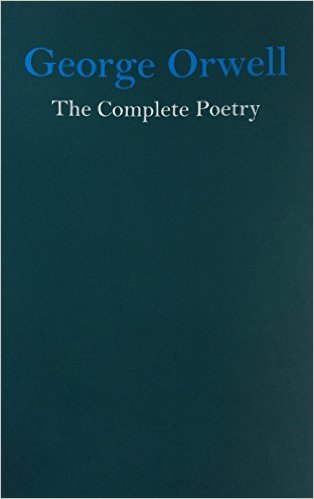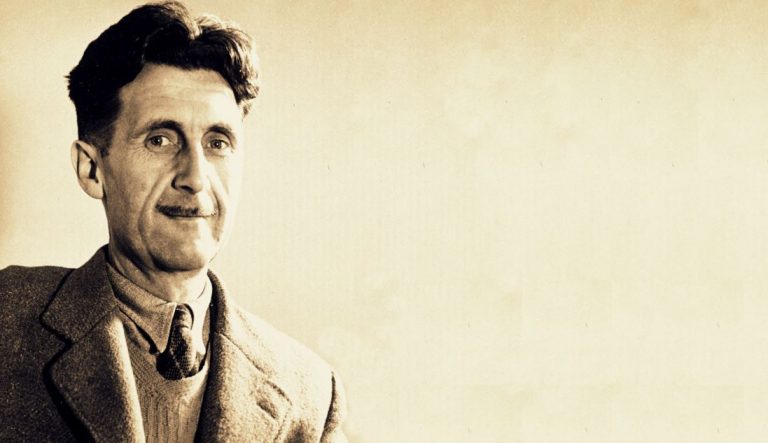 We all know George Orwell the novelist, the polemicist, the doom laden clairvoyant who used prose as his weapon to warn against totalitarianism. Despite the universally recognised phrases he bequeathed us, Orwell the man remains a mystery. In an age where people gush about what socks they wore for breakfast two Fridays’ ago, a venerated writer within the clasp of living memory who is shrouded in ambiguity is a warming thought. His new poetry collection, George Orwell: The Complete Poetry, tentatively demystifies a man who loved, raged and moaned like the people whose plight he compassionately exposed. From Orwell’s poetry as a student to the very last verse that poured out of him on his deathbed, we are provided with a tantalising tour of the surface of the mind of an engrossing contrarian.
We all know George Orwell the novelist, the polemicist, the doom laden clairvoyant who used prose as his weapon to warn against totalitarianism. Despite the universally recognised phrases he bequeathed us, Orwell the man remains a mystery. In an age where people gush about what socks they wore for breakfast two Fridays’ ago, a venerated writer within the clasp of living memory who is shrouded in ambiguity is a warming thought. His new poetry collection, George Orwell: The Complete Poetry, tentatively demystifies a man who loved, raged and moaned like the people whose plight he compassionately exposed. From Orwell’s poetry as a student to the very last verse that poured out of him on his deathbed, we are provided with a tantalising tour of the surface of the mind of an engrossing contrarian.
Each poem is prefaced by helpful explanatory notes courtesy of Dione Venables, contextualising Orwell’s personal relations around the point of composition. The notes are an excellent guide, and Venables avoids patronising the reader with over-indulgent ruminations. She, like us, is a giddy fan speculating on what Orwell could have meant with his always readable and occasionally incandescent poetic fragments.
Starkly, Orwell’s patriotism endured throughout his life. The poems are arranged chronologically, enabling us to trace a line from his rallying cry to England’s men to defend the country during the First World War in ‘Awake! Young Men of England’ to a scathing riposte to a pacifist during the Second World War in ‘As One Combatant to Another; Letter to ‘Obadiah Hornbrooke’. From youth to death, he expounded a passionate love for England that sat uneasily with the socialist creed he espoused throughout his life. Art is often viewed as a rebel’s refuge, but Orwell’s rebellion came against his comrades. In ‘One Combatant to Another…’ he invites sectarian backlash by fearlessly praising Winston Churchill’s leadership qualities and condemning his political ally’s anti-war stance. By marrying poetry and patriotism, Orwell gave credence to a conservative value, elevating love for his country above left-wing ideological purity he loathed.
An easily discernible meter scaffolds Orwell’s patriotic posturing and introspective lamentations, making most of his entries highly accessible. Much like his mantra for prose, Orwell favoured simple meter and memorable rhyme schemes to facilitate easy interpretation. A pentameter shaped hollow was the home in which his poetry nestled, only occasionally venturing into more metrically taxing territory. He had an ear for the music of rhyme, and a love for bouncing iambs that have captured millions of sorrowful hearts. His poetry always shows a musical quality, the sound of images and expression of feeling being more important than honing his technical prowess.
Orwell’s poetry draws comparisons to seismic wordsmiths of the 20th century. Acolytes of former poet laureate John Betjeman will note that he and Orwell shared an appreciation for simple rhymes and quotidian themes, making them kindred spirits in verse. The influence of Rudyard Kipling, the man Orwell slammed as ‘the prophet of British imperialism’, is clearly present in the playfully didactic ‘Wall Game’. Notwithstanding the personal nature of his poetry, Orwell wanted his poetry to appeal to ordinary people who weren’t perennially buried in books. He explored everyday topics, rather than culturally elitist references Modernists prized to keep the ‘illiterate’ masses at bay. It is therefore surprising to find out that T. S. Eliot was a key influence in later life. The wonderful ‘St. Andrew’s Day’, a personal highlight and one readers of 1936’s Keep the Aspidistra Flying will be familiar with, is a prime example of Orwell’s social conscience flexing within a poetic framework. A bruising fusion of an attractive rhyme scheme with a caustic critique of how financial instability enslaves the working-class, ‘St. Andrew’s Day’ is the poetic cuckoo in the Aspidistra’s nest, conveying immediacy and explicit anger more powerfully than the novel.
It’s fascinating to track the poetic voyage of Orwell from youth to tragically premature death. Some of us have confided in poetry when we are gloomy, or found comfort in verse when love deserts us. Orwell was exactly the same. Poetry was a repository in which he intermittently relieved himself of the anguish he couldn’t bluntly address in his famous prose. By the end of the collection, we’ve shuffled a little closer to as full an understanding of Orwell as we can achieve thanks to poetry’s capacity to coax out visceral emotions. Budding poetry enthusiasts will find plenty not only in the accessible meter that helps even his most cynical poems skip along, but in the universal themes of rejection and loss that will appeal to the disillusioned. All it takes is one line to change our lives. Within this collection, you might just find that line.
Some of the coverage you find on Cultured Vultures contains affiliate links, which provide us with small commissions based on purchases made from visiting our site.

